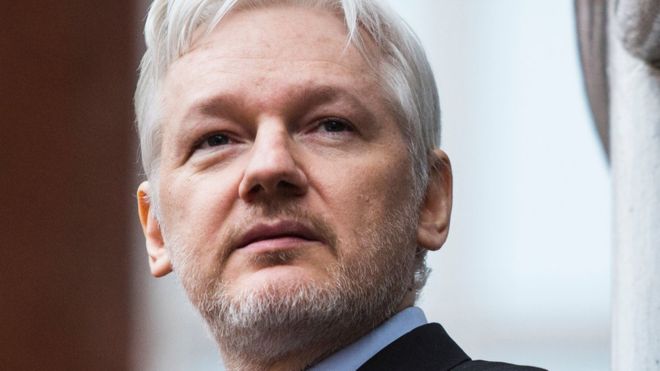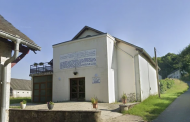UK police invited into Ecuadorian embassy where WikiLeaks founder was granted refuge in 2012
The United States has requested the extradition of WikiLeaks founder Julian Assange, British police said, after they arrested him at the Ecuadorian embassy in London on Thursday.
Assange’s lawyer Jennifer Robinson said: “The US warrant was issued in December 2017 and is for conspiracy with Chelsea Manning in early 2010.”
The WikiLeaks founder was granted refuge in the embassy in 2012 while on bail in the UK over sexual assault allegations against him in Sweden.
At the time, Assange claimed that if he was extradited to Sweden he might be arrested by the US and face charges relating to WikiLeaks’s publication of hundreds of thousands of US diplomatic cables.
UK police said they arrested Assange after being “invited into the embassy by the ambassador, following the Ecuadorian government’s withdrawal of asylum.”
Scotland Yard said: “He has been taken into custody at a central London police station where he will remain, before being presented before Westminster Magistrates’ Court as soon as is possible. The MPS (Metropolitan Police Service) had a duty to execute the warrant, on behalf of Westminster Magistrates’ Court, and was invited into the embassy by the Ambassador, following the Ecuadorian government’s withdrawal of asylum.”
Lenin Moreno, president of Ecuador, said in a statement: “Granting or withdrawing asylum is a sovereign right of the Ecuadorian state, according to international law. Today, I announce that the discourteous and aggressive behaviour of Mr Julian Assange, the hostile and threatening declaration of its allied organisation, against Ecuador, and especially the transgression of international treaties, have led the situation to a point where the asylum of Mr Assange is unsustainable and no longer viable. Ecuador sovereignly has decided to terminate the diplomatic asylum granted to Mr Assange in 2012.
“For six years and 10 months, the Ecuadorian people have protected the human rights of Mr Assange and have provided for his everyday needs at the facilities of our Embassy in London.
“When I became the president of Ecuador, I inherited this situation and decided to adopt a protocol to set the daily life rules at the Embassy, which is less than anyone may expect from a guest hosted at his own house.
“Ecuador has fulfilled its obligations in the framework of international law. On the other hand, Mr Assange violated, repeatedly, clear cut provisions of the conventions on diplomatic asylum of Havana and Caracas; despite the fact that he was requested on several occasions to respect and abide by these rules.”
His arrest comes a day after Wikileaks accused the Ecuadorean Government of an “extensive spying operation” against Assange. WikiLeaks claims meetings with lawyers and a doctor inside the embassy over the past year were secretly filmed.
Assange’s departure was previewed in a tweet by WikiLeaks on Thursday night, which said a “high level source within the Ecuadorian state has told WikiLeaks that Julian Assange will be expelled within ‘hours to days’ using the Ina Papers offshore scandal as a pretext – and that it already has an agreement with the UK for his arrest”.
The Ina Papers scandal revolve around allegations that Ecuador’s president, Lenin Moreno, corruptly benefited from an offshore account in Panama. Moreno denies any wrongdoing.
The journalist and Assange supporter John Pilger called on Thursday night for people to “fill the street outside the embassy and protect him and show solidarity with a courageous man”.
Overnight, a handful of people, some describing themselves as activists, began arriving at the embassy in Knightsbridge. A row of orange tents, filled with white teddy bears, a guitar and a large babushka doll, was set up outside the building. Supporters spelled out “No expulsion” in lights on the footpath outside the embassy. Police cars were stationed nearby throughout the night.
US authorities have never officially confirmed that they have charged Assange, but in November 2018 a mistake in a document filed in an unrelated case hinted that criminal charges might have been prepared in secret.
The court filing, submitted apparently in error by US prosecutors, mentioned criminal charges against someone named “Assange” even though that was not the name of the defendant. Legal analysts said the error was likely to have been caused by prosecutors copying and pasting from sealed documents.
The relationship between Assange and his hosts has soured over the years. In March, Assange’s internet access was cut off and he was forbidden from having visitors.
Moreno has said Assange had “repeatedly violated” the conditions of his asylum in the country’s London embassy.
Speaking to the Ecuadorian radio broadcasters’ association on Tuesday, Moreno said “photos of my bedroom, what I eat and how my wife and daughters and friends dance” had been circulated on social media but stopped short of accusing WikiLeaks directly of circulating hacked photos and wiretapping his phone calls and private conversations.








































admin in: How the Muslim Brotherhood betrayed Saudi Arabia?
Great article with insight ...
https://www.viagrapascherfr.com/achat-sildenafil-pfizer-tarif/ in: Cross-region cooperation between anti-terrorism agencies needed
Hello there, just became aware of your blog through Google, and found ...